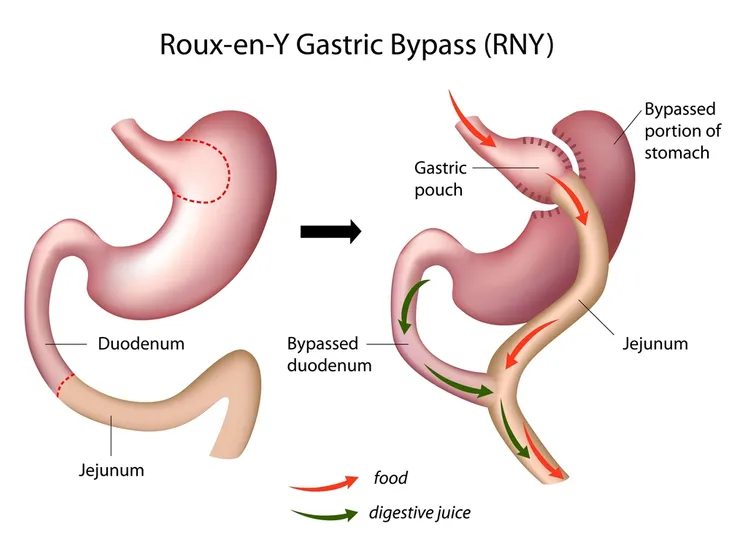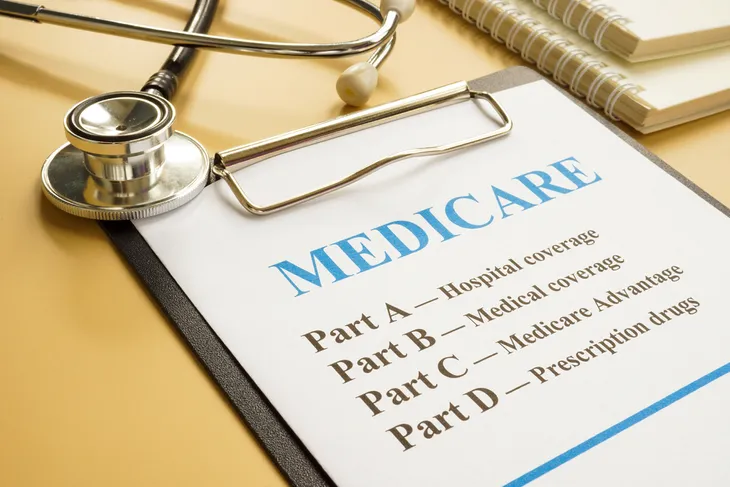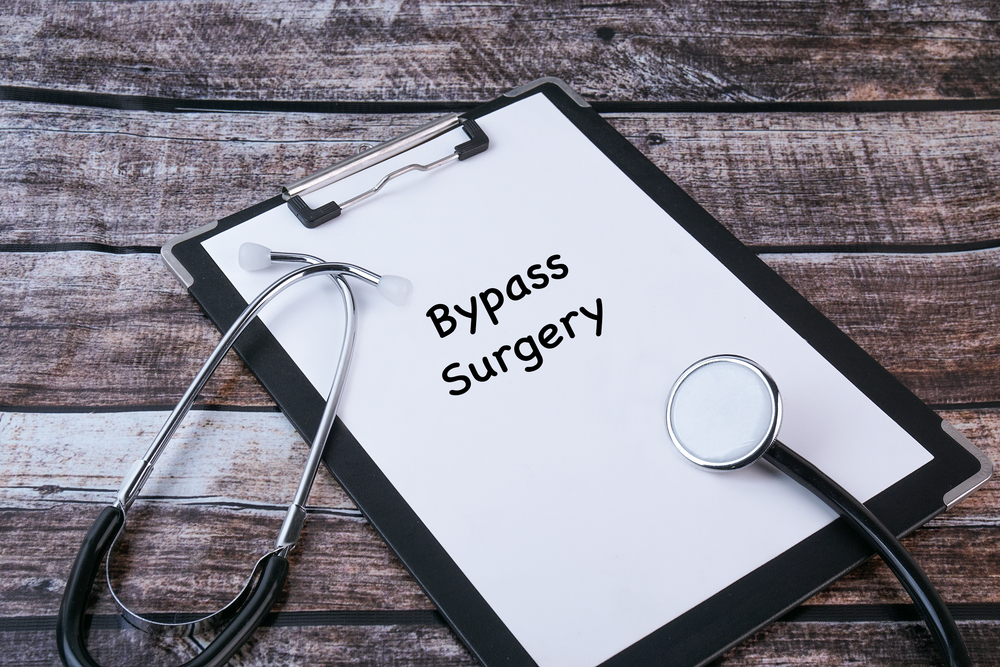- Gastric bypass surgery is the most common type of weight loss surgery in the U.S.
- The cost of this procedure can range from $18,000 to $35,000 depending on several factors.
- Health insurance may be able to help pay for the procedure if you meet eligibility requirements.
One of the most common health conditions in the U.S. is obesity. According to the Centers for Disease Control and Prevention, obesity prevalence was over 42-percent in 2017 and 2018. Obesity can be concerning since it increases your risk for conditions such as stroke, heart disease, type 2 diabetes, and even some types of cancer.
A healthy diet and exercise are two of the most important things to do on a weight loss journey. But for some people, gastric bypass surgery could be a helpful procedure to achieve weight loss goals more efficiently. Here’s what you need to know about this surgery and the costs associated with it.
What Is Gastric Bypass Surgery?
The goal of gastric bypass is to shrink the size of your stomach. This makes it so the patient cannot eat as much as they are used to, preventing you from overeating after surgery and gaining weight. WebMD says gastric bypass, which is also known as Roux-en-Y gastric bypass, is the most common gastric bypass surgery in the country.
The surgeon starts by limiting how much food you can eat by stapling parts of the stomach together. From there, a Y-shaped section of the small intestine is attached to the pouch. This allows food to skip part of your digestive system and helps you absorb fewer calories and nutrients.
 Alila Medical Media / Shutterstock
Alila Medical Media / ShutterstockThe Benefits
This surgery can be life-changing for people wanting to embrace a healthier lifestyle. The most obvious benefit is that by reducing how much the stomach is able to carry, patients will eat less food and make limiting their food intake easier. This will ideally help them to maintain long-term weight loss goals.
Besides helping with weight loss, Cleveland Clinic says there are other worthwhile benefits. This includes:
- Improved cardiovascular health
- Long-term remission for type 2 diabetes
- Eliminate sleep apnea
- Depression relief
- Joint pain relief
- Improved fertility
 NakoPhotography / Shutterstock
NakoPhotography / ShutterstockWho Is a Candidate for Gastric Bypass Surgery?
Not everyone who wishes to lose weight is the right candidate for gastric bypass surgery. This procedure is intended for people carrying a certain weight and body mass index (BMI). According to UCSF, these are the requirements to be eligible:
- Have a BMI of 40 or higher
- Weigh less than 450-pounds
Eligible patients may also have a BMI between 35 and 40, but they must also have been diagnosed with an obesity-related condition. Some examples include heart disease, diabetes, and high blood pressure.
 Bangkoker / Shutterstock
Bangkoker / ShutterstockRisk Factors
All surgeries come with some risk and gastric bypass is no exception. While it can be an excellent way for individuals to continue reaching their weight loss goals, it’s possible that a person may experience some complications during or after the operation.
Mayo Clinic says the risks of this surgery are similar to those that might occur during other types of abdominal surgery. This may include:
- Excessive bleeding
- Infection
- Blood clots
- Lung or breathing problems
- Adverse reactions to anesthesia
- Gastrointestinal system leaks
 Spotmatik Ltd / Shutterstock
Spotmatik Ltd / ShutterstockLonger Term Risk Factors
Not all risk factors happen right away during or immediately after surgery. In some cases, a person may develop certain complications while recovering. This is why it’s important for patients to be vigilant and monitor their symptoms after surgery.
Stanford Health Care says some additional risk factors of gastric bypass include:
- Malnutrition from vitamin deficiency.
- Tightening and narrowing of the new opening between the stomach and intestine (known as stomal stenosis).
- Dumping syndrome, where solid parts of meals get directly dumped from the stomach into the small intestine without being properly digested.
 novak.elcic / Shutterstock
novak.elcic / ShutterstockAnastomotic Leaking
Another possible risk factor associated with gastric bypass is anastomotic leaking. Anastomosis is a new connection created in the intestines and stomach during surgery that will not completely heal and leak. After surgery, digestive juices and partially digested foods may leak.
Hopkins Medicine says this occurs in about 1.5 to 6-percent of bypass procedures. This can happen anywhere from 3-days to several weeks after surgery. Unfortunately, this can be a life-threatening complication and requires immediate treatment.
Preparing for Surgery
Most doctors will require gastric bypass patients to follow certain regimens ahead of surgery. VeryWell Health says months before, patients need to attend a presurgical education and lifestyle program. Gastric bypass isn’t a magical cure-all to weight loss. This program will ensure patients are knowledgeable of how to maintain a healthy lifestyle for successful results.
About 2-weeks before surgery, patients will need to be on a liquid diet. Along with daily protein shakes, drinking eight glasses of zero-calorie liquids are required. Right before surgery, you may also be asked to shower and wash the abdominal area with an antibacterial soap.
 Prostock-studio / Shutterstock
Prostock-studio / ShutterstockRecovering from Surgery
It’s really important to do exactly what your doctor recommends when recovering from gastric bypass surgery. Your body goes through a huge change during surgery that will take some time to adjust. After surgery, you’ll be on a liquid diet that will eventually transition to pureed foods until the body is able to tolerate firmer foods.
Mayo Clinic says you can also expect to have limits on how much you can eat and drink. To help prevent malnutrition, you might be advised to take vitamin and mineral supplements. Frequent medical checkups are also necessary to monitor your health for any potential complications.
Gastric bypass surgery is an investment in your health. That being said, it’s a bit of a pricey one. CostHelper says the typical cost can range from $18,000 to $35,000 without insurance. The cost will depend on the surgeon doing the procedure and where you’re located.
You may also have to pay for costs unrelated to the surgery itself. For instance, some patients may need to consult with a nutritionist and/or psychologist ahead of the procedure. There’s also a chance that you’ll experience medical problems due to the surgery which may require additional treatment that increases your medical bills.
 fizkes / Shutterstock
fizkes / ShutterstockDoes Medicare Cover Bariatric Surgery?
Since bariatric surgery costs tens of thousands of dollars, it would be nice to have insurance help pay for it. The amount paid for by health insurance will ultimately depend on your specific plan and what it covers.
If you’re a Medicare subscriber, you may qualify for coverage. The insurer can pay for the procedure as long as you have a BMI of 30 or higher, at least one health condition caused by obesity, and have been unsuccessful at weight loss through other methods.
 Suphaksorn Thongwongboot / Shutterstock
Suphaksorn Thongwongboot / ShutterstockMedicare can bring the cost of bariatric surgery down significantly. This insurer can help pay for the procedure, diagnosis, and even recovery services. For example, Part A plans can cover hospital services and Part B can help cover medical services required for the surgery.
Healthline says you can expect to pay for standard out-of-pocket costs such as:
- Part A deductible ($1,408)
- Part A coinsurance for hospitalizations exceeding 60 days (up to $704 per day)
- Part B deductible ($198)
- Part D deductible (up to $435)
- Other premium, coinsurance, and copayment costs
 Vitalii Vodolazskyi / Shutterstock
Vitalii Vodolazskyi / ShutterstockTalk With Your Doctor to Learn More
Weight loss can often be achieved through proper diet and getting regular exercise. But if you’re looking for another way to meet your goals in the long term, gastric bypass surgery may be helpful.
Those interested in gastric bypass surgery should first talk with their doctor to see if it’s an option. They will review your eligibility to determine whether you’re a candidate for the procedure. From there, you’ll be able to go through with the procedure and implement other healthy lifestyle choices into your routine.
 PopTika / Shutterstock
PopTika / Shutterstock




